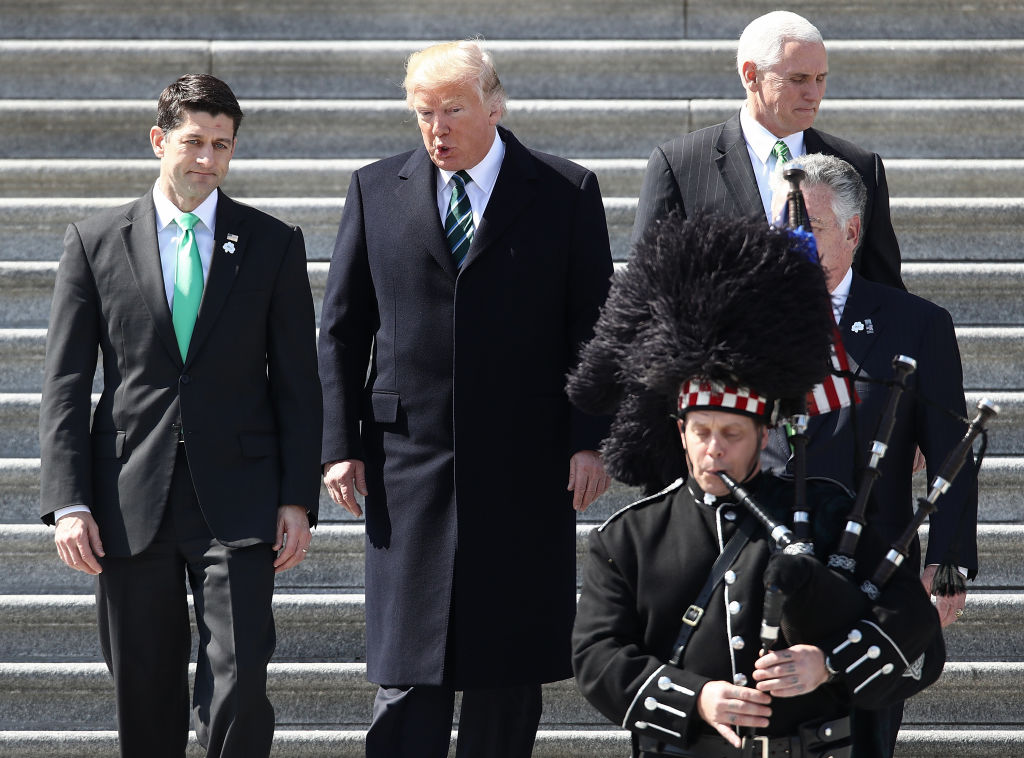How the GOP health-care bill could harm everyone with employer-based insurance


A free daily email with the biggest news stories of the day – and the best features from TheWeek.com
You are now subscribed
Your newsletter sign-up was successful
Republican leaders have been trying to reassure the critical number of House Republicans worried that the current health-care bill would "torpedo" protections for people with pre-existing conditions, as Rep. Fred Upton (R-Mich.) put it on Tuesday, in part by insisting that very few states would actually use the allowed waivers to scrap "essential health benefits" or rules preventing insurers from charging more due to pre-existing conditions. But to paraphrase President Trump, health care is complicated, and even one state messing with the essential benefits guaranteed under the Affordable Care Act could affect health insurance nationwide, says health economist Matthew Fielder at the Brookings Institution.
"In particular, a single state's decision to weaken or eliminate its essential health benefit standards could weaken or effectively eliminate the ACA's guarantee of protection against catastrophic costs for people with coverage through large employer plans in every state," he writes. ObamaCare bans limits on annual and lifetime health expenditures and requires insurance plans to cap out-of-pocket costs, but only for the defined essential health benefits. If these benefits are eliminated partially or completely, Fielder says, so are the cost protections for those benefits.
Most Americans have health coverage through work, and roughly 115 million of them through large employer plans, Fielder writes. These plans typically "cover individuals working in multiple states," and "current regulations and guidance permit large employer plans to apply any state's definition of essential health benefits for the purposes of determining the scope of the ban on annual and lifetime limits and the requirement to cap out-of-pocket spending." He continues:
The Week
Escape your echo chamber. Get the facts behind the news, plus analysis from multiple perspectives.

Sign up for The Week's Free Newsletters
From our morning news briefing to a weekly Good News Newsletter, get the best of The Week delivered directly to your inbox.
From our morning news briefing to a weekly Good News Newsletter, get the best of The Week delivered directly to your inbox.
Suppose that even one state secured a waiver that allowed it to drop maternity services, mental health services, or prescription drugs from the definition of essential health benefits — a plausible scenario since these services were commonly not covered in individual market plans prior to the ACA and since waivers would be easy to obtain. In this case, a large employer plan that wanted to impose an annual or lifetime on limit on these services could simply adopt that state's definition of essential health benefits. ... In a more extreme, but still plausible, scenario in which even one state elected to completely eliminate its essential health benefit standards, the requirement to provide these protections would effectively disappear entirely for large employer plans nationwide. [Fielder, Brookings Institution]
Trump could pretty easily fix this but probably wouldn't, Fielder says. You can read more at Brookings.
A free daily email with the biggest news stories of the day – and the best features from TheWeek.com
Peter has worked as a news and culture writer and editor at The Week since the site's launch in 2008. He covers politics, world affairs, religion and cultural currents. His journalism career began as a copy editor at a financial newswire and has included editorial positions at The New York Times Magazine, Facts on File, and Oregon State University.
-
 The ‘ravenous’ demand for Cornish minerals
The ‘ravenous’ demand for Cornish mineralsUnder the Radar Growing need for critical minerals to power tech has intensified ‘appetite’ for lithium, which could be a ‘huge boon’ for local economy
-
 Why are election experts taking Trump’s midterm threats seriously?
Why are election experts taking Trump’s midterm threats seriously?IN THE SPOTLIGHT As the president muses about polling place deployments and a centralized electoral system aimed at one-party control, lawmakers are taking this administration at its word
-
 ‘Restaurateurs have become millionaires’
‘Restaurateurs have become millionaires’Instant Opinion Opinion, comment and editorials of the day
-
 TikTok secures deal to remain in US
TikTok secures deal to remain in USSpeed Read ByteDance will form a US version of the popular video-sharing platform
-
 Unemployment rate ticks up amid fall job losses
Unemployment rate ticks up amid fall job lossesSpeed Read Data released by the Commerce Department indicates ‘one of the weakest American labor markets in years’
-
 US mints final penny after 232-year run
US mints final penny after 232-year runSpeed Read Production of the one-cent coin has ended
-
 Warner Bros. explores sale amid Paramount bids
Warner Bros. explores sale amid Paramount bidsSpeed Read The media giant, home to HBO and DC Studios, has received interest from multiple buying parties
-
 Gold tops $4K per ounce, signaling financial unease
Gold tops $4K per ounce, signaling financial uneaseSpeed Read Investors are worried about President Donald Trump’s trade war
-
 Electronic Arts to go private in record $55B deal
Electronic Arts to go private in record $55B dealspeed read The video game giant is behind ‘The Sims’ and ‘Madden NFL’
-
 New York court tosses Trump's $500M fraud fine
New York court tosses Trump's $500M fraud fineSpeed Read A divided appeals court threw out a hefty penalty against President Trump for fraudulently inflating his wealth
-
 Trump said to seek government stake in Intel
Trump said to seek government stake in IntelSpeed Read The president and Intel CEO Lip-Bu Tan reportedly discussed the proposal at a recent meeting
